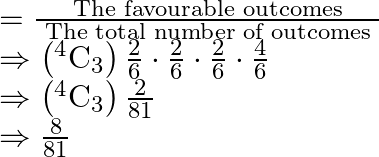(i) Using Bernoulli’s Trial ![]() Success
Success ![]()
![]()
We know that the favourable outcomes of getting exactly 3 successes will be, either getting 1 or a 6 i.e, total, ![]() probability
probability
The probability of success is ![]() and of failure is
and of failure is ![]() .
.
Thus, the probability of getting exactly 3 successes will be

(ii) Using Bernoulli’s Trial ![]() Success
Success ![]()
![]()
We know that the favourable outcomes of getting at least 2 successes will be, either getting 1 or a 6 i.e, total, ![]() probability
probability
The probability of success is ![]() and of failure is
and of failure is ![]() .
.
Thus, the probability of getting at least 2 successes will be

A die is thrown 4 times. ‘Getting a 1 or a 6 ‘ is considered a success, Find the probability of getting
(i) exactly 3 successes
(ii) at least 2 successes
(i) exactly 3 successes
(ii) at least 2 successes
A die is thrown 4 times. ‘Getting a 1 or a 6 ‘ is considered a success, Find the probability of getting
(i) exactly 3 successes
(ii) at least 2 successes
(i) exactly 3 successes
(ii) at least 2 successes
